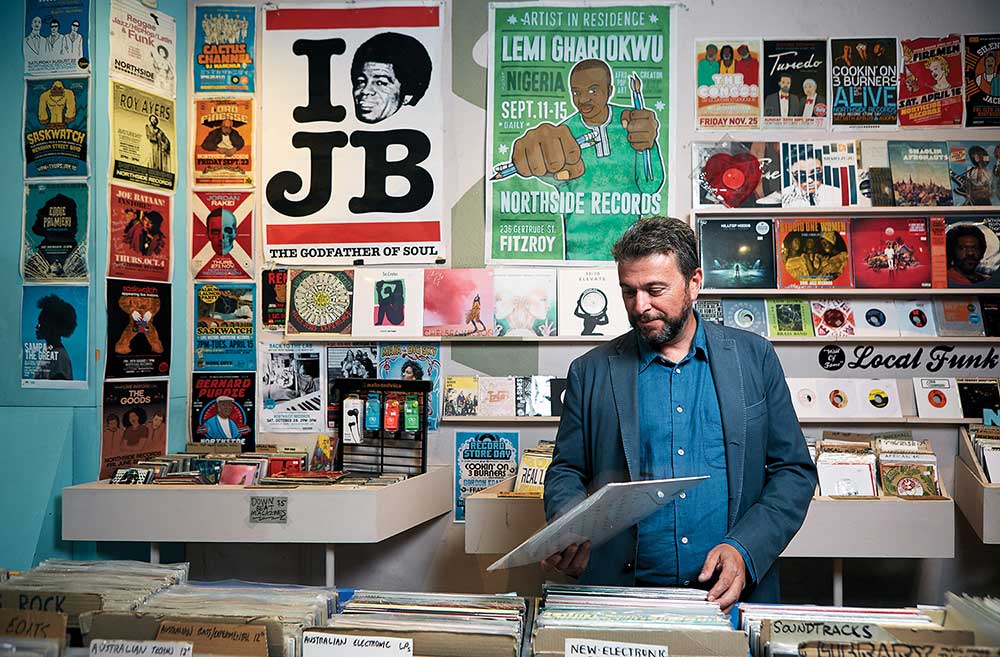
- The independent music sector represents one-third of the recorded music market, yet its fragmented nature makes it difficult for independents to be represented online.
- Monash alumnus, Charles Caldas saw a global opportunity for independent labels and artists to “compete toe-to-toe with the majors” in the online market.
- Since its launch in 2008, Caldas' enterprise, Merlin, has grown to become the biggest agency representing the digital rights of independent artists on streaming platforms such as Spotify.
Charles Caldas’s experiences at university set him on a path that would see him build a multimillion-dollar enterprise. And it stemmed not from his studies, but from a most unlikely source.
It was the band the Monash University arts student formed with fellow students that would be instrumental in his future and lead him to be co-founder and CEO of global digital rights agency Merlin.
Caldas has been at the helm of Merlin for 12 years – an agency that represents tens of thousands of independent record labels from 63 countries in the brave, not-so-new world of online music platforms, and turned over US$845 million last year.
Through this not-for-profit enterprise, independent labels signed to Merlin for a small fee are assured royalties from streaming services such as Spotify and YouTube, and a share of Merlin’s annual profit, which is growing each year in line with the seemingly unstoppable expansion of the digital music sector.
“We give labels the tools and ability to get into the market quickly and efficiently, and in a competitive way – and see those benefits flow through,” he says. “Seeing this globalisation of music and our labels thriving is incredibly satisfying.”
Caldas’s passion for independent music came from being part of it – through Monash radio station 3MU and his band, These Future Kings, which formed, rehearsed, recorded and played at Monash. Through the band he “fell into the industry”, packing boxes during the holidays at the small independent record label that had signed them.
From there he went to Shock Entertainment, which – over 16 years, including nine as CEO – he helped grow from “six people working out of a little house” to one of the biggest independent music companies in Australia. And through this experience, he was exposed early to the emerging force that would turn the model of music distribution on its head – digital downloads.
But while fear and negativity swirled around the breakdown of the traditional model, particularly in relation to piracy, Caldas saw an opportunity – and an obligation. He says the independent sector, while representing one-third of the recorded music market, is by its nature, fragmented. And this was making it difficult for the interests of independents to be represented online.
Unlike multinational major labels such as Sony and Warner that, with their global infrastructure, could cover the online interests of thousands of artists with a single licensing agreement, the new digital music businesses faced having to negotiate individual agreements with a sea of independent labels. Also, many independent labels reported being offered inferior terms compared to the major labels by some distribution platforms.
Levelling the competition
Caldas saw that the independent sector needed a central representative entity to remove an emerging two-tier marketplace and ensure its artists could “compete toe-to-toe with the majors” in the online market.
“The principle behind Merlin was to create a global, efficient one-stop solution to allow any digital music service to access an independent repertoire via one organisation.”
And so, in 2008 – the same year the now ubiquitous digital music service Spotify launched – Caldas started Merlin in collaboration with several leading independents.
While there were initial logistical challenges, Caldas says the independents were excited by the prospects that digital platforms provided for circumventing traditional distribution avenues and delivering music direct to the market.
“Every independent always thought they were working with amazing music, and if they could get that music in front of consumers they would love it,” he says.
And love it they have. Merlin announced in June that, since its launch, it had returned more than two billion US dollars to its members – independent labels and musicians from around the world, including increasingly from non-traditional markets as far flung as Brazil and Indonesia.
It’s a figure fuelled by the extraordinary growth dynamic of streaming services that have globalised the marketplace and created virtual record stores with limitless shelf space.
And it’s a figure that dwarfs the US$10 million Caldas and his co-founders had dared hope for when they started out.
“The notion that I would ever have been in control of that sort of money ... well, I don’t think I would have taken the job if I had known,” he says.
Getting back to grassroots
Now, having helped build Merlin to that level, Caldas is stepping down as CEO and preparing for his next adventure. Never shy of venturing into new territory – as he did with both Merlin and Shock – he is exploring opportunities, again, at the grassroots.
“Merlin has been an incredible success and its been a privilege to be part of, but what drives me is helping organisations navigate change and opportunity – to go from ‘point A’ to ‘point B’ based on growth and innovation – and it’s time for another one of those challenges,” he says.
Independent music, he says, will remain his focus, as the sector continues its worldwide expansion. “We’re finally seeing a market where quality rises to the top – where the labels releasing amazing music by amazing artists have an opportunity to put them in front of global consumers,” he says. “There is so much happening in this space and so many developments in terms of new technology and new markets, so I’ll be looking at projects that will make this next phase as interesting as the last.”
And, after 12 years as expats based in London, Caldas and his family are feeling the pull of home. “At a personal level we are reassessing where home is and where we want to spend the next stage of our lives,” he says. “And when you look at where your friends and centres of gravity are, they tend to be where you grew up and went to university.”
Find out more about this topic and study opportunities at the Graduate Study Expo





